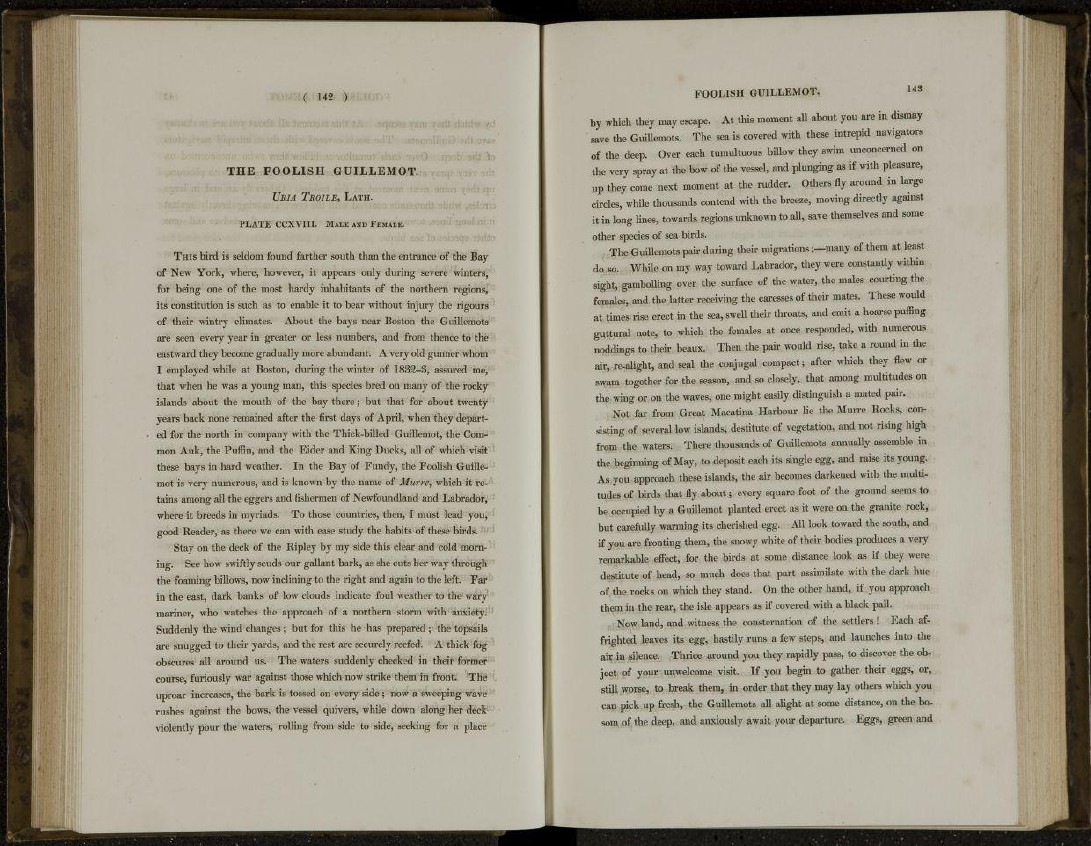
( 142 )
THE FOOLISH GUILLEMOT.
UBIA IROILE, LATH.
PLATE CCXVIII. MALE AND FEMALE.
•
THIS bird is seldom found farther south than the entrance of the Bay
of New York, where, however, it appears only during severe winters,
for being one of the most hardy inhabitants of the northern regions,
its constitution is such as to enable it to bear without injury the rigours
of their wintry climates. About the bays near Boston the Guillemots
are seen every year in greater or less numbers, and from thence to the
eastward they become gradually more abundant. A very old gunner whom
I employed while at Boston, during the winter of 1832-3, assured me,
that when he was a young man, this species bred on many of the rocky
islands about the mouth of the bay there; but that for about twenty
years back none remained after the first days of April, when they departed
for the north in company with the Thick-billed Guillemot, the Common
Auk, the Puffin, and the Eider and King Ducks, all of which visit
these bays in hard weather. In the Bay of Fundy, the Foolish Guillemot
is very numerous, and is known by the name of Murre, which it retains
among all the eggers and fishermen of Newfoundland and Labrador,
where it breeds in myriads. To those countries, then, I must lead you,
good Reader, as there we can with ease study the habits of these birds.
Stay on the deck of the Ripley by my side this clear and cold morning.
See how swiftly scuds our gallant bark, as she cuts her way through
the foaming billows, now inclining to the right and again to the left. Far
in the east, dark banks of low clouds indicate foul weather to the wary
mariner, who watches the approach of a northern storm with anxiety.
Suddenly the wind changes ; but for this he has prepared ; the topsails
are snugged to their yards, and the rest are securely reefed. A thick fog
obscures all around us. The waters suddenly checked in their former
course, furiously war against those which now strike them in front. The
uproar increases, the bark is tossed on every side; now a sweeping wave
rushes against the bows, the vessel quivers, while down along her deck
violently pour the waters, rolling from side to side, seeking for a place
FOOLISH GUILLEMOT. 143
by which they may escape. At this moment all about you are in dismay
save the Guillemots. The sea is covered with these intrepid navigators
of the deep. Over each tumultuous billow they swim unconcerned on
the very spray at the bow of the vessel, and plunging as if with pleasure,
up they come next moment at the rudder. Others fly around in large
circles, while thousands contend with the breeze, moving directly against
it in long lines, towards regions unknown to all, save themselves and some
other species of sea birds.
The Guillemots pair during their migrations;—many of them at least
do so. While on my way toward Labrador, they were constantly within
sight, gambolling over the surface of the water, the males courting the
females, and the latter receiving the caresses of their mates. These would
at times rise erect in the sea, swell their throats, and emit a hoarse puffing
guttural note, to which the females at once responded, with numerous
noddings to their beaux. Then the pair would rise, take a round in the
air, re-alight, and seal the conjugal compact; after which they flew or
swam together for the season, and so closely, that among multitudes on
the wing or on the waves, one might easily distinguish a mated pair.
Not far from Great Macatina Harbour lie the Murre Rocks, consisting
of several low islands, destitute of vegetation, and not rising high
from the waters. There thousands of Guillemots annually assemble in
the beginning of May, to deposit each its single egg, and raise its young.
As you approach these islands, the air becomes darkened with the multitudes
of birds that fly about; every square foot of the ground seems to
be occupied by a Guillemot planted erect as it were on the granite rock,
but carefully warming its cherished egg. All look toward the south, and
if you are fronting them, the snowy white of their bodies produces a very
remarkable effect, for the birds at some distance look as if they were
destitute of head, so much does that part assimilate with the dark hue
of the rocks on which they stand. On the other hand, if you approach
them in the rear, the isle appears as if covered with a black pall.
Now land, and witness the consternation of the settlers ! Each affrighted
leaves its egg, hastily runs a few steps, and launches into the
air in silence. Thrice around you they rapidly pass, to discover the object
of your unwelcome visit. If you begin to gather their eggs, or,
still worse, to break them, in order that they may lay others which you
can pick up fresh, the Guillemots all alight at some distance, on the bosom
of the deep, and anxiously await your departure. Eggs, green and